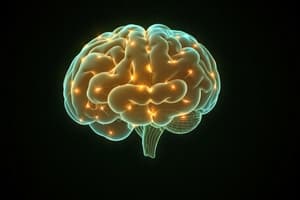Podcast
Questions and Answers
What is the first step in creating a strong internal representation of a video?
What is the first step in creating a strong internal representation of a video?
- Link the stimuli to prior knowledge
- Store the information for later recall
- Access personal memory related to the video (correct)
- Produce the right letter shapes to write it down
Which process is NOT involved in reporting what we remember?
Which process is NOT involved in reporting what we remember?
- Accessing what we recall
- Transforming auditory input into visual input (correct)
- Moving hands to produce letter shapes
- Converting to a linguistic code
What is the primary focus of cognitive psychology?
What is the primary focus of cognitive psychology?
- The organization and coordination of mental processes (correct)
- The behavior of individuals under stress
- The historical evolution of psychological theories
- The biological functions of the brain
How can cognitive research be applied in clinical psychology?
How can cognitive research be applied in clinical psychology?
Which major topic in cognitive psychology involves understanding human thought processes?
Which major topic in cognitive psychology involves understanding human thought processes?
Which of the following best describes cognition?
Which of the following best describes cognition?
Which skill is NOT explicitly mentioned as a development skill in cognitive psychology?
Which skill is NOT explicitly mentioned as a development skill in cognitive psychology?
What is Wilhelm Wundt known for in the field of psychology?
What is Wilhelm Wundt known for in the field of psychology?
When engaging in a lecture, which of the following cognitive tasks might you NOT be performing?
When engaging in a lecture, which of the following cognitive tasks might you NOT be performing?
Which of the following statements about cognitive psychology is true?
Which of the following statements about cognitive psychology is true?
What is the primary focus of structuralism in psychology?
What is the primary focus of structuralism in psychology?
Which method did Wundt use to study consciousness?
Which method did Wundt use to study consciousness?
What did William James contribute to the field of psychology?
What did William James contribute to the field of psychology?
According to the James-Lange theory of emotion, how do emotions arise?
According to the James-Lange theory of emotion, how do emotions arise?
What distinguishes functionalism from structuralism?
What distinguishes functionalism from structuralism?
Who is considered the 'Father' of behaviorism?
Who is considered the 'Father' of behaviorism?
What is the primary subject matter of behaviorism?
What is the primary subject matter of behaviorism?
What concept is associated with operant conditioning?
What concept is associated with operant conditioning?
What is the primary focus of operant conditioning?
What is the primary focus of operant conditioning?
Which of the following best describes negative reinforcement?
Which of the following best describes negative reinforcement?
What was a key outcome of the Cognitive Revolution in the 1950s?
What was a key outcome of the Cognitive Revolution in the 1950s?
Which step is NOT part of the experimentation process in psychology?
Which step is NOT part of the experimentation process in psychology?
What limitation is associated with experiments conducted in laboratory settings?
What limitation is associated with experiments conducted in laboratory settings?
What is a characteristic of covert observation?
What is a characteristic of covert observation?
Which of the following disciplines is NOT part of Cognitive Science?
Which of the following disciplines is NOT part of Cognitive Science?
What is the main purpose of structured observation in research?
What is the main purpose of structured observation in research?
What is an advantage of using coding schemes in research?
What is an advantage of using coding schemes in research?
What is a significant limitation of coding schemes?
What is a significant limitation of coding schemes?
What are researchers primarily aiming to achieve with case studies in cognitive neuropsychology?
What are researchers primarily aiming to achieve with case studies in cognitive neuropsychology?
In the context of cognitive neuropsychology, what is a double dissociation?
In the context of cognitive neuropsychology, what is a double dissociation?
What type of data does unstructured observation primarily yield?
What type of data does unstructured observation primarily yield?
Which example demonstrates a single dissociation?
Which example demonstrates a single dissociation?
What is a potential drawback of unstructured observations?
What is a potential drawback of unstructured observations?
Which author is known for providing examples of dissociations in cognitive neuropsychology?
Which author is known for providing examples of dissociations in cognitive neuropsychology?
Flashcards
Cognitive Psychology
Cognitive Psychology
The scientific study of mental processes such as thinking, learning, memory, and attention.
Cognition
Cognition
The processes involved in acquiring, storing, transforming, and using knowledge.
Organization of Mental Processes
Organization of Mental Processes
Cognitive psychology investigates how mental processes are organized and work together.
Cognition in Everyday Life
Cognition in Everyday Life
Signup and view all the flashcards
Example of Cognition - Remembering a Video
Example of Cognition - Remembering a Video
Signup and view all the flashcards
Internal Video Representation
Internal Video Representation
Signup and view all the flashcards
Linking Stimuli to Prior Knowledge
Linking Stimuli to Prior Knowledge
Signup and view all the flashcards
Process of Recalling and Reporting Information
Process of Recalling and Reporting Information
Signup and view all the flashcards
Knowledge Acquisition and Use
Knowledge Acquisition and Use
Signup and view all the flashcards
Operant Conditioning
Operant Conditioning
Signup and view all the flashcards
Positive Reinforcement
Positive Reinforcement
Signup and view all the flashcards
Negative Reinforcement
Negative Reinforcement
Signup and view all the flashcards
Positive Punishment
Positive Punishment
Signup and view all the flashcards
Negative Punishment
Negative Punishment
Signup and view all the flashcards
Cognitive Revolution
Cognitive Revolution
Signup and view all the flashcards
Experimental Cognitive Psychology
Experimental Cognitive Psychology
Signup and view all the flashcards
Observation
Observation
Signup and view all the flashcards
Structuralism
Structuralism
Signup and view all the flashcards
Introspection
Introspection
Signup and view all the flashcards
Functionalism
Functionalism
Signup and view all the flashcards
Behaviorism
Behaviorism
Signup and view all the flashcards
James-Lange Theory of Emotion
James-Lange Theory of Emotion
Signup and view all the flashcards
Stimulus Error
Stimulus Error
Signup and view all the flashcards
Stream of Consciousness
Stream of Consciousness
Signup and view all the flashcards
Coding scheme
Coding scheme
Signup and view all the flashcards
Unstructured Observation
Unstructured Observation
Signup and view all the flashcards
Case study
Case study
Signup and view all the flashcards
Single Dissociation
Single Dissociation
Signup and view all the flashcards
Double Dissociation
Double Dissociation
Signup and view all the flashcards
Cognitive Modules
Cognitive Modules
Signup and view all the flashcards
Object Orientation
Object Orientation
Signup and view all the flashcards
Visual Control of Actions
Visual Control of Actions
Signup and view all the flashcards
Study Notes
Module Outcomes and Aims
- Introduce students to cognitive psychology theories, findings, and methods.
- Enable students to describe key cognitive theories and research findings.
- Equip students with analytical, communication, critical thinking, independent working, and research skills.
Cognitive Psychology
- Investigates mental processes, organized and coordinated thinking, and knowledge.
- Aims to understand how mental processes function.
Cognition
- The mental process encompassing acquisition, storage, transformation, and use of knowledge.
- This spans all species, but the focus will be on human cognition.
Example of Cognitive Processes
- Watching a video and remembering involves internal representation creation, memory access, language use (auditory/visual), and linking knowledge.
- Converting information into written form involves storing salient information, accessing recalled information, converting it to linguistic codes, and motor actions to write.
Major Topics in Cognitive Psychology
- Perception
- Attention
- Memory
- Language
- Thinking
- Reasoning
- Problem Solving
Applications of Cognitive Research
- Everyday Life: Law (eyewitness testimony), Computer Systems, Instruction, Clinical Psychology (understanding brain disorders), and Study Skills.
Implications for Other Fields
- Clinical Sciences
- Social Psychology
- Economics
Wilhelm Wundt
- Considered the "father of experimental psychology".
- Founded the first psychology laboratory at the University of Leipzig (1879).
- Established psychology as a separate scientific discipline.
- Published the first journal for psychological research (1881).
Structuralism
- Founded by Wundt.
- Defined psychology as studying immediate experience.
- Explores the structure of the mind through introspection (self-observation of mental contents).
- Aims to identify the basic elements of consciousness.
Introspection
- Wundt's method of self-observation.
- Participants report their inner experiences (sensations, feelings, images).
William James
- Pioneer in American psychology and philosophy.
- President of the American Psychological Association.
- Emphasized psychology as a functional science, focusing on the individual's active engagement with the environment.
- Introduced the concept of "stream of consciousness".
- Developed the James-Lange theory of emotions.
Functionalism
- Emphasizes the function of consciousness rather than its structure.
- Inspired by Darwin.
- Focuses on how mental processes help individuals adapt to their environment.
- Proposed by William James; further developed by James Angell.
John B. Watson
- "Father" of behaviorism.
- Argued that studying mental processes is not scientifically valid.
- Believed that psychology should focus only on observable behaviors.
- Proposed that behavior is learned through conditioning.
Behaviorism
- Focuses on observable behavior rather than internal mental states.
- Learning occurs through associations between stimuli and responses.
- Key figures include John B. Watson and B.F. Skinner.
Operant Conditioning (B.F. Skinner)
- Learning through rewards and punishments for behavior.
- Associations are made between behavior and consequences.
- Techniques like positive and negative reinforcement or punishment are used to modify behavior.
The Cognitive Revolution
- Reacting against behaviorism.
- Emphasized mental processes (perception, memory, language).
- Interdisciplinary field, blending concepts from various other fields (psychology, linguistics, computer science).
Cognitive Science
- Interdisciplinary investigation of mental processes.
Cognitive Neuroscience
- Studies the neural basis of mental processes.
- Uses brain imaging techniques (e.g., fMRI, ERP).
Experimentation
- Key Steps: defining a problem, formulating a testable hypothesis, designing and conducting an experiment, analysing data, and concluding.
- Cognitive psychology employs experiments, observations, and case studies.
Observation
- A research method where the researcher observes participants in their natural settings.
- Can be overt (participants know) or covert (participants are unaware).
- Structured observation requires coding schemes for recording behaviours to gain quantitative data.
Case Studies
- Useful in cognitive neuropsychology for studying atypical cognitive performance.
- Investigates effects of brain damage; builds theories from cases of atypical cognitive conditions.
- Looks at specific patterns of performance (intact and impaired).
Studying That Suits You
Use AI to generate personalized quizzes and flashcards to suit your learning preferences.



